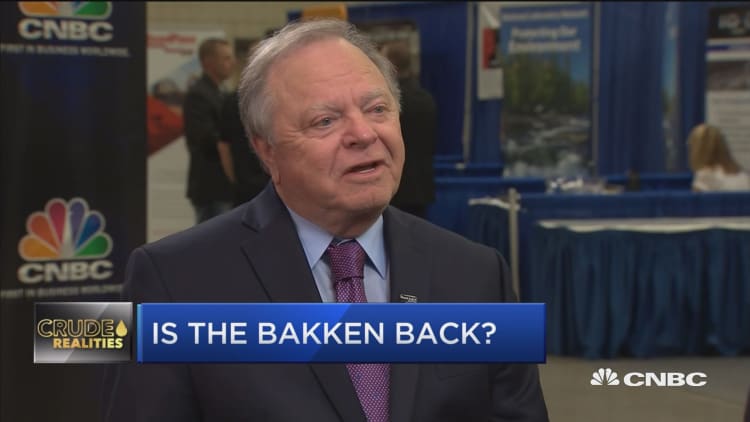
Oil prices still have room to run after rallying to 3½-year highs, drilling pioneer Harold Hamm said Wednesday.
The Continental Resources chairman and CEO said benchmark U.S. crude prices could still rise by about $10 from current levels near $72 a barrel.
"We're not looking at $100 oil in the future, or probably $90 oil, but it certainly could be in the mid-$70s and low $80s," he told CNBC in an interview on the sidelines of the Williston Basin Petroleum Conference in Bismarck, North Dakota.
Continental, one of the so-called frackers that pioneered drilling in North Dakota's Bakken shale fields, is getting an extra boost from higher prices. According to Hamm, the company did not hedge its production. Hedging, or locking in a price with buyers for future oil deliveries, protects drillers against price drops, but the practice can also leave money on the table if the cost of crude rises significantly.
Shares of Continental are up 60 percent over the last 12 months, and 26 percent this year. Meanwhile, the XOP, a closely followed ETF that tracks oil and gas exploration and production stocks, is up nearly 22 percent over the last year and almost 16 percent year to date.
At current prices, Hamm said Continental could generate $1 billion in free cash flow, which the company will use to reduce its debt load following a prolonged period of low crude prices. Producers like Continental rely on expensive drilling methods like hydraulic fracturing and horizontal drilling to squeeze oil and natural gas from shale rock formations.
Continental ended the first quarter of 2018 with $6.17 billion in debt. Hamm said the company's goal is to get that down to $5 billion.
That dovetails with the dominant trend in the relatively young shale fracking industry: exercising financial discipline in order to start returning more cash to shareholders.
Shale drilling has boosted U.S. crude production to record highs, but surging output in West Texas has led to bottlenecks because the region doesn't have enough pipelines to handle the new supply. That's an issue North Dakota has largely overcome, said Hamm.
"We had that up here, as you'll recall, and certainly before we got adequate pipelines and gathering," said Hamm. "But now that we have it, our cost structure is much lower, and they still have headwinds in that area."
"We saw a differential change of three-and-a-half dollars when [the Dakota Access Pipeline] came on. That was huge and made it easier getting that to market," he said.
The Dakota Access Pipeline began carrying crude from North Dakota to Illinois last year after President Donald Trump cleared a path for the pipeline, which spurred protests by Native American tribes and environmentalists that drew national attention.


